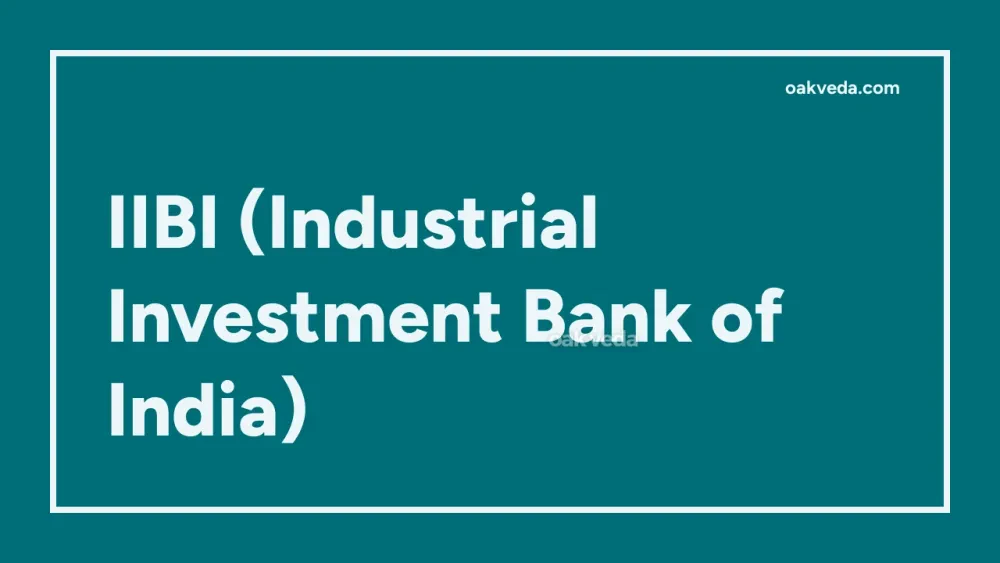
What is the Full Form of IIBI?
The full form of IIBI is Industrial Investment Bank of India. This financial institution played a significant role in India's industrial development for over four decades before its closure in 2012.
What is Industrial Investment Bank of India?
The Industrial Investment Bank of India (IIBI) was a government-run financial investment company in India. Established in 1971, IIBI functioned as a development bank with a primary focus on revitalizing sick industrial companies and promoting industrial growth in the country.
Origin and Development of Industrial Investment Bank of India
IIBI's journey began in 1971 when it was founded by a resolution of the Indian Parliament under Section 617 of the Companies Act. The bank's headquarters were located in Calcutta (now Kolkata), with operations spanning across major Indian cities including Mumbai, New Delhi, Bengaluru, Chennai, Ahmedabad, and Guwahati.
A significant milestone in IIBI's history occurred in 1985 when the Industrial Reconstruction Corporation of India Ltd., established in 1971 for rehabilitating sick industrial firms, was restructured as the Industrial Reconstruction Bank of India under the IRBI Act of 1984.
How did Industrial Investment Bank of India work?
IIBI operated as a specialized financial institution, offering a wide range of products and services to support industrial development and revival. Its primary functions included:
- Providing project finance loans
- Offering loan arrangement assistance
- Extending short-term, non-project asset-backed funding
- Facilitating cash flow-based financing
- Supporting the rehabilitation of sick industrial units
The bank worked closely with various industrial sectors, catering to both large corporations and smaller enterprises facing financial difficulties.
Functions of Industrial Investment Bank of India
IIBI's core functions revolved around fostering industrial growth and supporting struggling companies. Some of its key functions included:
- Extending financial assistance to industrial enterprises
- Providing technical and managerial support to sick units
- Facilitating the restructuring of industrial companies
- Promoting the development of new industries
- Offering consultancy services for project appraisal and implementation
Applications of Industrial Investment Bank of India
IIBI's services found applications across various industrial sectors. The bank's clientele included prominent names such as:
- Videocon
- Great Threads
- Dr. Morepen
- Clutch Auto Limited
- JSW Ispat
- LML Motors
These companies, among many others, benefited from IIBI's financial and advisory services, which helped them navigate challenging economic conditions and pursue growth opportunities.
Features of Industrial Investment Bank of India
Some distinctive features of IIBI included:
- Government backing: As a government-run institution, IIBI enjoyed strong financial support and credibility.
- Specialized focus: The bank concentrated on industrial development and revival, making it a go-to institution for companies in need of specialized financial assistance.
- Wide geographical presence: With operations in major Indian cities, IIBI could cater to industrial needs across the country.
- Diverse product portfolio: The bank offered a range of financial products tailored to meet various industrial requirements.
- Expertise in industrial rehabilitation: IIBI developed significant expertise in reviving sick industrial units over its years of operation.
Benefits of Industrial Investment Bank of India
IIBI's operations brought several benefits to India's industrial landscape:
- Industrial revival: The bank played a crucial role in revitalizing struggling industries, helping to preserve jobs and maintain economic stability.
- Promotion of industrial growth: By providing financial and technical support, IIBI contributed to the expansion of India's industrial base.
- Specialized financial services: IIBI offered tailored financial solutions that may not have been available through traditional banking channels.
- Economic development: The bank's activities supported overall economic growth by fostering a robust industrial sector.
- Expert guidance: IIBI provided valuable advisory services, helping companies make informed decisions about their operations and investments.
Limitations or Challenges of Industrial Investment Bank of India
Despite its contributions, IIBI faced several challenges:
- Non-performing assets: The bank struggled with a high level of non-performing assets, which ultimately contributed to its closure.
- Changing economic landscape: As India's economy liberalized, the role of specialized development banks like IIBI became less clear.
- Competition from private sector banks: The growth of private banking in India created new challenges for government-run financial institutions.
- Operational inefficiencies: Like many public sector enterprises, IIBI faced criticism for operational inefficiencies and bureaucratic processes.
Future Developments in Industrial Finance
While IIBI ceased operations in 2012, the need for industrial finance and support continues. Future developments in this area may include:
- Specialized private sector institutions: Private banks and financial institutions may develop specialized divisions to cater to industrial finance needs.
- Government initiatives: New government programs or institutions may emerge to fill the gap left by IIBI's closure.
- Fintech solutions: Innovative financial technology solutions may provide new avenues for industrial financing and support.
- Public-private partnerships: Collaborative efforts between government and private sector entities may arise to address industrial development needs.
FAQs on IIBI Full Form
-
When was IIBI established? IIBI was established in 1971 by a resolution of the Indian Parliament.
-
What was the primary purpose of IIBI? The primary purpose of IIBI was to support industrial development and revitalize sick industrial companies in India.
-
Why was IIBI closed down? IIBI was closed down in 2012 due to various factors, including a high level of non-performing assets and changing economic conditions.
-
What happened to IIBI's assets after its closure? Deloitte & Touche was appointed to handle the non-performing assets of IIBI after its closure.
-
Were there any attempts to merge IIBI with other institutions? Yes, in 2005, a merger of IIBI with the Industrial Development Bank of India and the Industrial Finance Corporation of India was proposed, but IIBI declined the offer.
In conclusion, the Industrial Investment Bank of India (IIBI) played a significant role in India's industrial development for over four decades. While the institution no longer operates, its legacy continues to influence discussions on industrial finance and development in India.
You may be interested in:

